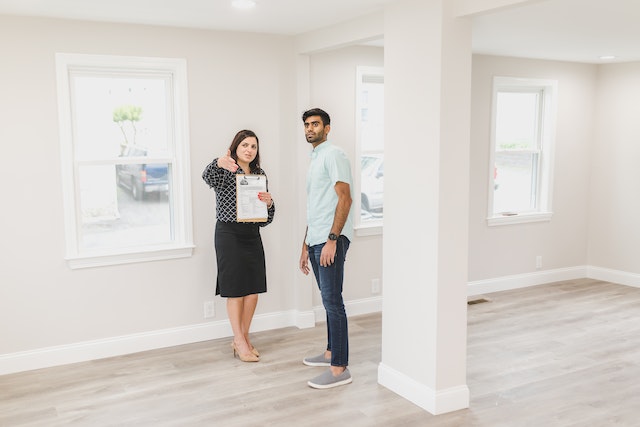If you are a first-time home buyer, it is essential that you create a comprehensive checklist of the features you must have in your new home. There are two main functions for any given residential property: personal occupancy and resale value. When you’ve narrowed down your reasons for purchasing a house, a home buying guide might be helpful. The path forward is simple if personal usage is your ultimate goal. If you are approaching this venture from an investing standpoint, though, you will likely have rental revenue and property appreciation as your overarching goals.

The sort of property you want to buy is more important than any of the other purchasing advice we’ll provide you today. You may choose the ideal investment property for your needs by considering your budget, the cost of maintenance, and the kind of investment.
Apartments, residential lots, villas, and other housing options are also available. However, if this is your first time buying a home, it might be difficult to choose the ideal home. Consequently, it is beneficial to consult with a person who has recently purchased a house or who has invested in real estate.
The following first-time home buyer tips are relevant whether you are purchasing a home for personal use or as an investment.
First-Time Home Buyer Tips:
#1: Seek Bank Approvals
Whether or not the project has been authorized by a reputable bank is a crucial factor to consider when purchasing a home. Due to the bank’s own checks and balances, these endeavors are guaranteed to adhere to all regulations and remain under budget at all times.
#2: Think About The Features and Requirements of The Building.
After settling on a certain home type, it’s time to think about the sort of life you want to lead, which is when the property’s features and amenities come into play.
#3: Take A Look At The Prices you’ve Been Paying For Upkeep.
Another crucial aspect to think about first-time home buyer, particularly if the property has a variety of facilities and services. The entire cost of living in a certain project may be estimated with the aid of questions regarding yearly maintenance fees asked in advance.

#4: Investigate The Means Through Which Your House Reduces Outside Noise.
It’s a frequent misconception that living on a higher level means less outside noise, but this isn’t necessarily the case. The noise from passing vehicles and pedestrians could go to your home if your land is adjacent to a major thoroughfare. Find out whether the windows the builder is giving you are really soundproof and will reduce the amount of noise you’ll have to deal with from the outside world. After all, you deserve to come home to a haven of calm and safety, far from the noise and chaos of the outside world.
#5: Vastu Check
Vastu compliance is important to many homeowners, regardless of their personal beliefs on the subject. As a result, most builders ensure that their residences adhere to the principles of Vastu. Inspecting this feature may be done at the same time as your house inspection.
#6: Investigate Current Setups
The city’s social infrastructure and connections should be the next things you look at. Invest in a home that is close to excellent medical facilities and schools, as well as one that has good citywide access.
Things To Think About Before Making a Purchase

The first thing you need to do is think about the big picture and how buying a house fits in with your plans. Simply put, you may want to convert your “wasted” rent payments into mortgage payments that build equity. Alternatively, maybe you take pride in the prospect of being your own landlord and see house ownership as a badge of independence.
Buying a house also has the potential to be a sound financial move. Defining your long-term plans for purchasing a house can help you get started in the correct path. Some questions to ponder for first-time home buyer are as follows.
#1: The First Question Is, “How is your financial Health?”
Do a thorough examination of your financial situation before browsing internet listings or falling in love with a certain house. Both the initial investment and the monthly maintenance costs of a house need to be accounted for. The results of this examination will reveal whether or not you are prepared to make this significant move.
#2: What Kind Of Dwelling Would You Want to Have?
A single-family home, a duplex, a townhouse, a condominium, a co-op, or a multifamily complex with two to four units are all available to you as residential property choices. It’s up to you to weigh the benefits and drawbacks of each kind of house and choose which one would best help you achieve your homeownership objectives. If you’re looking to save money on the purchase price, a fixer-upper may be the way to go. However, be aware that the time, sweat equity, and money it takes to convert a fixer-upper into your dream house may be much more than you anticipated.
#3: What Are Some Must-Have Amenities For Your New House?
While it’s wise to leave some wiggle room on this list, considering the magnitude of what may be the largest purchase of your life, you should demand that it fulfill your goals and requirements to the letter. Start with the big picture, such square footage and location, then work your way down to the nitty-gritty, like bathroom design and a well-stocked kitchen design with sturdy equipment. You may get a feel for the market value and availability of homes with the amenities you care about most by browsing real estate websites.
#4: What Is the Maximum Mortgage Amount That You Can Get?
Find out how much of a loan you may expect from a lender before you start looking for your first property. Lenders will look at your credit score, the amount of debt you have, your monthly salary, and how long you’ve been at your present work to determine how much of a mortgage they will give you. Also, many real estate brokers are unwilling to work with buyers who are unable to provide a clear budget.
#5: How Much House Can You Afford?
A bank may provide you a loan for a larger home than you are comfortable paying for. The fact that a bank is willing to loan you $300,000 is no guarantee that you should borrow that much. This is a common pitfall for first-time homeowners, who often find themselves “house poor” because they can’t afford basic living expenses like food, clothes, and transportation after paying their mortgage.
Conclusion
This summary should get you started in filling up any gaps in your understanding about purchasing a property. Keep in mind that your chances of getting the property you want at a price you can afford increase the more you know about the process before you start.

